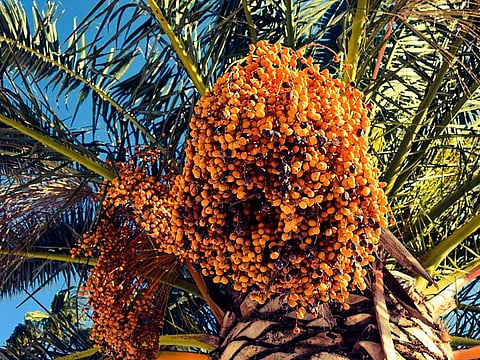How Abu Dhabi protects UAE’s ‘national treasure’ of date palm trees from pests
ADAFSA deploys environment-friendly safeguards to bolster food security and ecosystem

Abu Dhabi: The Abu Dhabi Agriculture and Food Safety Authority (ADAFSA) is currently executing an integrated approach to strengthen the biosecurity system across the emirate regarding animal and plant health.
Moreover, the Authority is implementing numerous programmes to manage agricultural pests, such as the Integrated Management of Palm Pests initiative. This programme controls palm tree pests in environmentally friendly ways, adhering to integrated pest management guidelines.
It also minimises economic damage caused by pests, reduces environmental pollution, and preserves the ecosystem by avoiding the indiscriminate use of agricultural pesticides.
Major pests
These programmes address the most significant palm pests, such as red palm weevils, long-horn stem borer, fruit stalk borer, lesser date moth and date palm dust mite. This is to safeguard the national treasure of palm trees, given their strategic significance in the emirate’s cultural heritage. Additionally, preserving palm trees and controlling pests is essential for supporting food security, preserving the ecosystem, and promoting the process of date production.
Sustainable safeguards
ADAFSA employs the integrated pest management approach, which utilises a combination of economic and environmental practices to manage harmful pests and insects sustainably, thereby reducing the risk to crops. Regarding palm trees, the integrated pest management approach outlines a series of precautionary measures to safeguard trees against pest infestations. These measures aim to address pest issues before they reach a critical stage, thus minimising the need to use pesticides or remove infected trees.
Emergency plan
ADAFSA has gone further by creating an emergency response plan for agricultural epidemic pests, a crucial component of the biosecurity system the Authority aims to establish. This plan aims to promote plant health and effectively control pests and plant pathogens in Abu Dhabi farms, thereby supporting the sustainability of the agricultural sector in the emirate. These institutional efforts have boosted the UAE’s and Abu Dhabi’s position among the most prepared countries in addressing agricultural pests. The Authority remains committed to adopting the best agricultural practices and the latest innovative technologies in the agriculture industry.
Training
Apart from conducting periodic surveys to monitor agricultural pests in farms across the emirate, ADAFSA also provides awareness and training on necessary agricultural practices that help to reduce pest infestation. Moreover, the Authority has established a database of the primary agricultural pests in the region. It has issued an agricultural pest register, which serves as a vital scientific reference and guide for researchers and farmers to identify pests that pose a threat to farms and learn about effective methods of controlling them.
Agricultural quarantine
ADAFSA is committed to promoting the use of biocontrol systems to control agricultural pests, reduce reliance on chemical pesticides, and protect the environment.
Agricultural quarantine is regarded as the primary means of defence against agricultural pests, as it involves implementing legislative measures and protocols to regulate the movement of agricultural materials and prevent the spread of pests into non-infected areas. It also aims to control and prevent the spread of infected areas by agricultural pests, weeds, and pathogens that can threaten the quality of agricultural production.
Furthermore, ADAFSA boasts state-of-the-art laboratories and three research stations that conduct thorough examinations and diagnoses of agricultural pests in open fields and greenhouses. The resulting data is employed in control programmes and the selection of plant varieties resistant to diseases and pests to achieve optimal productivity in agricultural crops.
Awareness workshop
ADAFSA recently organised a workshop to mark the International Day of Plant Health (May 12). The workshop, titled ‘The Importance of the Role of Agricultural Legislation in Supporting the Plant Protection System’, aimed to raise awareness of the vital role of agricultural legislation in promoting plant health and protecting crops against pests and diseases in the farms of the emirate of Abu Dhabi.
The workshop reviewed plant health policies and regulations, including the 2012 Agriculture and Food Policy, to prevent and control plant pests and diseases. These included the 2012 Agriculture and Food Policy, which features prevention measures and policies to control plant diseases and farm pests. Many decisions were made to prevent the spread and entry of agricultural pests in line with the aforementioned policies.
The workshop also reviewed Decision No. 3 of 2020, which regulates agricultural requirements for Abu Dhabi farms. This resolution requires farmers to report any diseases or agricultural pests on their farms to ADAFSA. It also includes programmes to control hazardous pests, such as the integrated palm pest management programme.
Sign up for the Daily Briefing
Get the latest news and updates straight to your inbox



